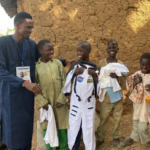By Kate Okorie
On an unusually sunny day in October in Umudike, Abia State, the brilliant rays of the sun cast a glow on Samuel Ijebuonwu’s traditional Nigerian two-piece attire, so that its vibrant blue hue matched the sky.
Squinting against the sun, Ijebuonwu followed a wide footpath flanking a large expanse of farmland. Then he turned right and disappeared behind a dense thicket of cassava plants.
Like many of his neighbours, Ijebuonwu has rented 1.5 hectares of land to grow his crops.
On this farmland, he cultivates a high-bearing cassava purchased from a seed company that bears the same name – Umudike – as its host community in Abia State, south-eastern Nigeria.
Ijebuonwu has not always cultivated modified cassava varieties, nor produced cassava on such a large scale.
“I used to farm in small plots of land behind my house and rented farmlands,” he explained.
Back then, when the edible cassava tubers matured, he harvested them to feed his family of six and sold the small surplus. The stems were either replanted, left to rot on the farm or given to friends free of charge.
He repeated this cycle year after year until 2019 when he was enlisted into the Umudike Seeds’ Cassava Seed Entrepreneurship Program and discovered he could make additional income from the stems of the improved cassava varieties.
“In the first year, my income grew by 10%,” Ijebuonwu said.
Cassava seed entrepreneurs (CSEs) sell cassava stems, also called seeds, as raw materials to other local farmers within their communities.
An analysis of the profitability of commercial seed production among the top 50% of CSEs in southern Nigeria, including Abia State, revealed that stem sales accounted for approximately two-thirds of total revenue.
A cassava bundle, comprising fifty stems can cost up to US$1.5 for the enhanced cassava varieties and US$1 for local ones.
“Sometimes you make more, sometimes less. It all depends on market demand,” Ijebuonwu explained, standing on a rectangular patch of fallow land that marked the boundary between his cassava farm and his neighbour’s.
He anticipated that his current cassava crop – which can take from six to eighteen months to mature – would only be ready for harvest by August or September 2024. However, before that time, he planned to harvest the stems to sell to other farmers during the early planting season in May.
“That’s the business!” he exclaimed.
Ijebuonwu has yet to decide the selling price for the stems in his next harvest as he is still monitoring the market.
Another neighbour, Daniel Sunday, however, is more focused on expansion than selling stems.
Sunday joined the Cassava Entrepreneurship Programme four years ago. He had been cultivating cassava in his backyard until he got in touch with a team from Umudike Seeds. He jumped at the opportunity to expand production, he said.
“After my first harvest as a CSE, I replanted all the stems into my one-hectare farmland. The profits from selling the roots covered the production costs, so there was no need to sell the seeds,” he explained.
He disclosed that he invested 290,000 naira (about US$373.8) and made approximately 480,000 (approximately US$616.7) after his harvest. Buoyed by the financial gain, he extended his farm to two hectares the following year.
He noted that his profit margin was higher than most farmers due to the cassava breed that he cultivates requiring little maintenance to thrive, reducing his expenses on inorganic fertilisers.
While satisfied with selling harvested tubers, he also intends to sell some cassava stems in the next harvesting season as a seed entrepreneur. Referrals from seed companies and research institutes, along with a surge in farming, means constant demand exists.
“When farmers come to the institute to buy improved cassava seeds, we direct them to the seed entrepreneurs,” said Chiedozie Egesi, Executive Director of the National Root Crops Research Institute (NRCRI).
Umudike Seeds was established by the NRCRI in 2019 to bridge the gap in the seed value chain by promoting novel seed varieties developed in its labs.
To achieve this goal, Umudike Seeds partners with seed entrepreneurs to multiply and distribute improved seed breeds to farmers within their communities.
Initially, farmers recruited under the seed company’s seed entrepreneurship initiative were known as Village Seed Entrepreneurs (VSEs).
“The branding team informed us that the name was not marketable, so we rebranded them as commercial seed entrepreneurs,” Egesi revealed.
Today, commercial publications by Umudike Seeds describe these farmers as “cassava seed entrepreneurs”.
The sustainability of Umudike Seeds has been associated with its commercialisation of the formal seed system – a key component missing in earlier formal cassava breeding projects.
“Nigeria is the highest producer of cassava globally, but we have not been producing efficiently,” explained Egesi.
Data from the Food and Agriculture Organization shows that Nigeria produced 63 million tonnes of cassava in 2021. However, the country’s productivity of 8.2 tonnes per hectare falls far below the global average yield of 11.08 tonnes per hectare, a situation Egesi attributed to disruptions in the supply of enhanced seed varieties.
“This is precisely what Umudike Seeds has been able to address through the CSEs,” he stated.
In their position as middlemen, the CSEs have helped shorten the time it takes for improved seed varieties to reach local communities.
“In the past, the seeds could stay on the institute’s shelf for up to 20 years. By the time they got to the farmers, they were no longer relevant,” Egesi said.
While cassava is naturally drought resistant, some improved varieties are further enhanced for drought tolerance. Those seeds are tested at the institute’s station in Kano State, a drought-prone region in northern Nigeria.
“This process helps us understand how the seeds perform under minimal rainfall,” he explained.
To qualify as CSEs, farmers must possess a minimum of two hectares of farmland dedicated to cultivating cassava and must hold certification from the National Agricultural Seed Council (NASC).
“Before the CSEs are cleared to sell improved seeds, they are required to undergo three levels of inspection by the NASC at the pre-production, production and post-production stages,” said Peter Chukwu, Production Officer at Umudike Seeds.
The certification body checks for properties like seed purity, plant spacing, weed control and disease susceptibility.
“Regular inspection by the NASC is necessary for quality assurance,” said Mark Tokhula, Head of Early Generation Seeds (EGS) Development at NRCRI. EGS comprising breeder and foundational seeds are the first stages in the production of the improved seed varieties.
Umudike also provides training and mentorship to the CSEs.
“The CSEs are taught marketing, quality assurance, disease control, and proper packaging and transportation techniques,” Tokhula said.
CSEs are also taught about the unique characteristics of each varietal, so they can grow and sell the right variety for local conditions.
While the varietal grown by Samuel Ijebuonwu – the highly coveted TME419 – is popular due to its high starch content, seed entrepreneurs still have difficulty convincing some farmers to purchase the stems from improved cassava varieties.
Uprooting a few cassava plants to reveal the tuber yield underground, Isaac Bosua, a Commercial Seed Entrepreneur (CSE) with 15 years of experience, showed how he employs a practical approach to win over sceptical farmers. Inviting them to his farm, he shows them the results, he said, first-hand. His hands-on approach rarely fails.
Bosua said he does not miss his days growing local cassava varieties despite the additional effort needed to market cassava stems of the improved variety.
“The difference between then and now is just too clear,” he said.
bird story agency
Samuel Ijebuonwu, a farmer in Umudike, Abia State, Nigeria, transitioned from small-scale cassava farming to large-scale cultivation after joining the Umudike Seeds' Cassava Seed Entrepreneurship Program in 2019. This program enabled him to generate additional income by selling cassava stems, also known as seeds. The profitability of this venture is underscored by the fact that stem sales account for approximately two-thirds of total revenue for top cassava seed entrepreneurs (CSEs) in southern Nigeria.
Another farmer, Daniel Sunday, expanded his cassava farming from backyard plots to two hectares after engaging with the program, which allowed him to gain financial benefits and reduce costs through efficient cultivation practices. The program, established by the National Root Crops Research Institute (NRCRI), supports farmers in multiplying and distributing improved seed breeds to enhance production efficiency.
The program's impact is significant as it helps distribute enhanced cassava varieties quickly to local communities, addressing past inefficiencies in cassava seed supply. Farmers must meet specific criteria, including holding certification from the National Agricultural Seed Council, to qualify as CSEs. These entrepreneurs play a crucial role in delivering quality seeds to farmers, with Umudike Seeds providing necessary training and support.
Despite the benefits, some farmers remain skeptical about adopting improved cassava varieties. Experienced CSEs, like Isaac Bosua, employ practical demonstrations to convince others of the advantages, showcasing the notable difference in yield and quality compared to traditional varieties.
Overall, the Umudike Seeds initiative bridges the gap in the seed value chain, promoting sustainable cassava production in Nigeria, the world's largest cassava producer, which, however, lags in productivity compared to global standards.







I recommend to look for the answer to your question in google.com